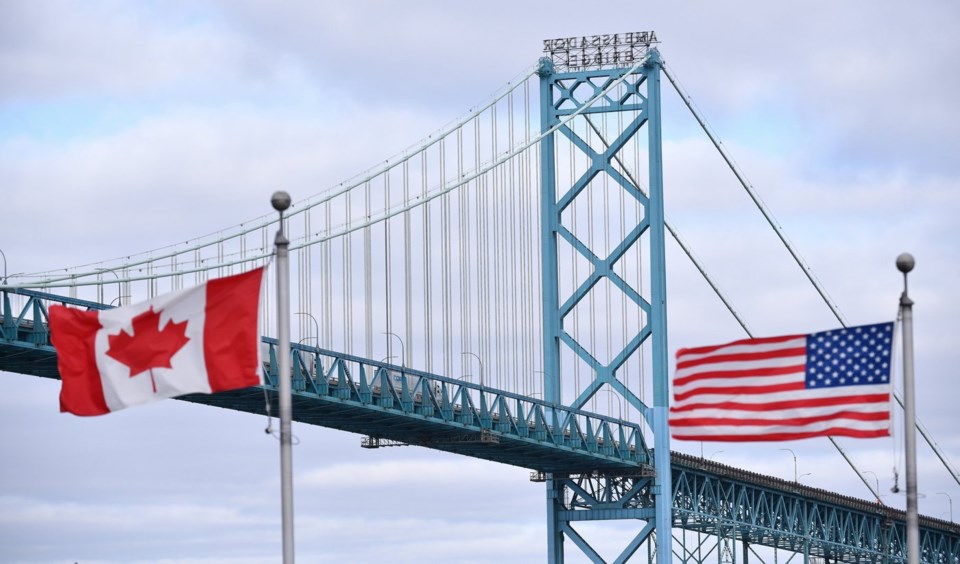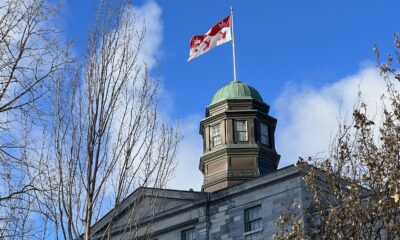Top Stories
Canada Defies 35% U.S. Tariffs; Economy Shows Unexpected Resilience

UPDATE: Canada’s economy is displaying surprising resilience against escalating U.S. tariffs, including a newly imposed 35% tariff on Canadian goods, announced by President Donald Trump. This development comes as the Bank of Canada’s governor, Tiff Macklem, emphasized the country’s ability to withstand this economic pressure during a press conference last week.
In a significant move, the U.S. tariffs now include hefty duties on steel, aluminum, and automobiles, impacting Canada’s largest trading relationship. Despite expectations of economic downturn, recent data indicates Canada is avoiding the worst-case scenario.
According to TD Bank economist Marc Ercolao, it’s “a bit of a surprise” to see the economy holding steady amid such disruption. “Many months ago, economic forecasters had predicted a much weaker Canadian economy. Obviously, that isn’t manifesting now,” he stated.
Statistics Canada released flash estimates revealing that while real GDP contracted slightly in April and May, the economy rebounded in June. If these trends continue, the overall growth for the second quarter could remain flat, a surprising outcome given the circumstances surrounding the tariffs.
Despite the volatility, Ercolao noted that the services sector remains robust, although manufacturing and transportation industries are feeling the brunt of the tariffs. In response, the federal government is rolling out programs to support workers affected by the tariffs and is accelerating infrastructure spending.
Confidence remains low but has shown signs of improvement according to the Bank of Canada’s recent surveys. Although unemployment is trending upward to nearly 7%, many sectors continue to expand their payrolls. “Consumption is still growing,” Macklem confirmed, while acknowledging that economic activity is being restrained by tariff-related uncertainties.
In an urgent decision, the Bank of Canada maintained its policy interest rate at 2.75% for the third consecutive time, indicating stability in the face of economic challenges. Following the latest GDP readings, BMO has raised its outlook for the third quarter, suggesting Canada could avoid a technical recession this year.
BMO chief economist Doug Porter noted that recent personal tax cuts and strong domestic demand for travel amid the trade war are likely to bolster economic performance this quarter. However, some analysts still anticipate a potential recession induced by tariffs as negotiations surrounding the CUSMA trade agreement loom ahead in 2026.
In a more severe scenario outlined by the Bank of Canada, the removal of Canada’s CUSMA exemption could lead to a 1.25% drop in real GDP by 2027. Despite this, the overall outlook remains cautiously optimistic, with expectations of continued growth.
As businesses adapt to ongoing trade restrictions, Ercolao emphasized that the gradual implementation of tariffs has allowed companies time to adjust, preventing a more severe economic contraction. “Had the tariffs been imposed at once, we would have likely faced a significant downturn,” he explained.
This developing situation highlights the intricate balance Canada must maintain as it navigates its economic future amid increasing U.S. pressures. The immediate focus is on how ongoing adjustments will impact the Canadian economy as the year progresses.
Stay tuned for further updates as this situation evolves.
-

 Politics4 weeks ago
Politics4 weeks agoSecwepemc First Nation Seeks Aboriginal Title Over Kamloops Area
-

 World5 months ago
World5 months agoScientists Unearth Ancient Antarctic Ice to Unlock Climate Secrets
-

 Entertainment5 months ago
Entertainment5 months agoTrump and McCormick to Announce $70 Billion Energy Investments
-

 Science5 months ago
Science5 months agoFour Astronauts Return to Earth After International Space Station Mission
-

 Lifestyle5 months ago
Lifestyle5 months agoTransLink Launches Food Truck Program to Boost Revenue in Vancouver
-

 Technology3 months ago
Technology3 months agoApple Notes Enhances Functionality with Markdown Support in macOS 26
-

 Lifestyle3 months ago
Lifestyle3 months agoManitoba’s Burger Champion Shines Again Amid Dining Innovations
-

 Top Stories2 months ago
Top Stories2 months agoUrgent Update: Fatal Crash on Highway 99 Claims Life of Pitt Meadows Man
-

 Politics4 months ago
Politics4 months agoUkrainian Tennis Star Elina Svitolina Faces Death Threats Online
-

 Sports5 months ago
Sports5 months agoSearch Underway for Missing Hunter Amid Hokkaido Bear Emergency
-

 Politics5 months ago
Politics5 months agoCarney Engages First Nations Leaders at Development Law Summit
-

 Technology5 months ago
Technology5 months agoFrosthaven Launches Early Access on July 31, 2025



















